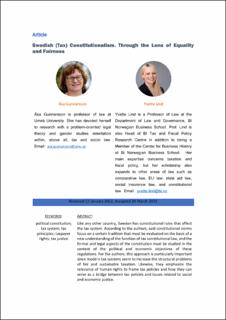| dc.contributor.author | Gunnarson, Åsa | |
| dc.contributor.author | Lind, Yvette | |
| dc.date.accessioned | 2023-12-05T13:51:24Z | |
| dc.date.available | 2023-12-05T13:51:24Z | |
| dc.date.created | 2023-03-23T10:56:14Z | |
| dc.date.issued | 2023 | |
| dc.identifier.citation | Review of international & European economic law. 2023, 2 (3), . | |
| dc.identifier.issn | 2938-0642 | |
| dc.identifier.uri | https://hdl.handle.net/11250/3106077 | |
| dc.description.abstract | Like any other country, Sweden has constitutional rules that affect the tax system. According to the authors, said constitutional norms focus on a certain tradition that must be evaluated on the basis of a new understanding of the function of tax constitutional law, and the formal and legal aspects of the constitution must be studied in the context of the political and economic objectives of these regulations. For the authors, this approach is particularly important since modern tax systems seem to increase the structural problems of fair and sustainable taxation. Likewise, they emphasize the relevance of human rights to frame tax policies and how they can serve as a bridge between tax policies and issues related to social and economic justice. | |
| dc.description.abstract | Swedish (tax) constitutionalism. Through the lens of equality and fairness | |
| dc.language.iso | eng | |
| dc.title | Swedish (tax) constitutionalism. Through the lens of equality and fairness | |
| dc.title.alternative | Swedish (tax) constitutionalism. Through the lens of equality and fairness | |
| dc.type | Journal article | |
| dc.description.version | publishedVersion | |
| dc.source.pagenumber | 12 | |
| dc.source.volume | 2 | |
| dc.source.journal | Review of international & European economic law | |
| dc.source.issue | 3 | |
| dc.identifier.cristin | 2136344 | |
| cristin.ispublished | true | |
| cristin.fulltext | original | |
